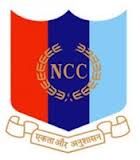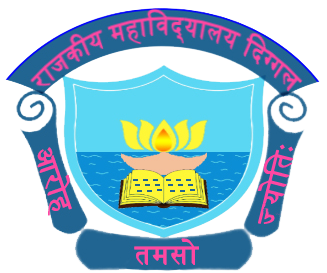NATIONAL CADET CORPS (NCC)

Associate NCC Officer (ANO)
Lieutenant Dr. Naresh Kumar
Introduction
During First World War, Britisher ‘s created the University Corps with an aim for second line of defence and also to have a large pool of trained youth available for employment into the Armed Forces. NCC in India was conceptualized and raised before independence, mainly with an aim to groom the youth, boys and girls both, nurture them and channelize their energy towards nation building by making them responsible citizens.
After independence, the present day NCC came into existence on 16 Apr 1948, through XXXI Act of Parliament. NCC was formally inaugurated on 15 Jul 1948. The Girls Division of the NCC was raised in Jul 1949. On 01 Apr 1950, Air Wing was raised, with one Air Squadron each at Bombay and Kolkata. The Naval Wing of the NCC was raised in Jul 1952, thus completing the true representation of all services in the Corps.
Today, the NCC has an enrolled strength of more than 13.5 Lakhs cadets and it basically comprises of two divisions of all the three Services i.e., the Senior Division/ Senior Wing for boys / girls from colleges and the Junior Division/Junior Wing for boys /girls from schools. The Motto of NCC is ‗Unity and Discipline ‘.
Current Aims
(a) To develop qualities of Development of Character, Comradeship, Discipline, Secular Outlook, Spirit of Adventure, Sportsmanship, Ideals of selfless service among the youth of the country.
(b) To create a human resource of Organized, Trained and Motivated youth, to provide leadership in all walks of life and always be available for the service of the nation.
(c) To provide a suitable environment to motivate the youth to take up a career in the Armed Forces.
Core Values
The NCC is a responsive, learning and continuously evolving organization. Its activity is guided by certain core values that we endeavor to instill among all ranks of the NCC. These include the following:
(a) A sense of patriotic commitment to encourage cadets to contribute to national development.
(b) Respect for diversities in religion, language, culture, ethnicity, life style and habitat to instill a sense of National unity and social cohesion.
(c) Abiding commitment to learn and adhere to the norms and values enshrined in the Indian Constitution.
(d) Understanding the value of a just and impartial exercise of authority.
(e) Ability to participate in community development and other social programme.
(f) A healthy life style free of substance abuse and other unhealthy practices.
(g) Sensitivity to the needs of poor and socially disadvantaged fellow citizens.
(h) Inculcating habits of restraint and self-awareness.
(j) Understanding the values of honesty, truthfulness, self-sacrifice, perseverance and hard work.
(k) Respect for knowledge, wisdom and the power of ideas.
Training Concept & Philosophy
The Training Philosophy is based on the following concept: –
(a) Comprehensive training for Empowerment of Youth ‘to earn the Right to Lead ‘.
(b) Module based training to cover: –
(i) Character building and Competence Development.
(ii) Basic Military Training.
(iii) Social Awareness and Service.
(c) Cadet friendly curriculum eliciting involvement and obviating additional burden on students with instructors acting as facilitators for developing competencies and talents in an individualistic as well as team cantered environment.
(d) Innovative, interesting and safe conduct of training with high degree of visibility to inspire youth, duly supported by appropriate training infrastructure and logistics support for boy and girl cadets.
(e) Professional training by a pool of dedicated and competent trainers through a well-structured ‗Train the Trainer ‘programme and Refresher programmes for broad based expertise and to enhance trainer skills.
(f) Progressive Institutionalized training culminating into camps/ competitions/activities at the National level.
(g) Use the internet effectively to develop camaraderie and strengthen bonding amongst NCC cadets, energies training and providing ready access to Knowledge Bank.
(h) Inculcate National Integration through Regional and National Integration Camps.
(j) Offer a Global perspective and exposure through youth Exchange Programme.
(k) Regular appraisal to identify redundancies and deficiencies in the organization and curriculum for suitable remedial measures.
Objectives
The activities of the NCC are conducted with the following training objectives: –
(a) To train volunteer youth to become confident, committed and competent leaders in all walks of life.
(b) To enhance the awareness level of cadets for being responsible citizens of the country.
(c) Provide opportunities and encourage cadets to enhance their knowledge / awareness levels on life / soft / communication skills, character building / personality development.
(d) Conduct activities to provide value-based contributions towards society in terms of social and community development.
(e) Undertake adventure activities for development of leadership qualities and risk-taking abilities.
(f) Provide a platform to launch ―good-will ambassadors‖ cadets to project the image of the country overseas.
(g) Provide an environment to motivate cadets to join the armed forces as a career.
Terminal Objective of NCC
To develop a highly motivated, patriotic, selfless, disciplined and enterprising youth – who is capable of providing leadership in any walk of life for the betterment of the nation.
Training Principles Keeping pace with the changing environment, the principles of NCC Training will be as follows:-
(a) JD/JW to be for two years while SD/SW to be for three years.
(b) Separate syllabus for JD/JW and SD/SW.
(c) Tailor-made syllabus for professional institutes to encourage enrolment of cadets.
(d) Revised training curricula in a military environment with due emphasis on soft skill enhancement, social responsibilities, adventure and sports.
(e) Uniformity in syllabus for boys and girls.
(f) Common Syllabus for all three wings to be approximately of 60 to 70% and Specialized Service Syllabus training will be 30 to 40 %.
(g) Greater emphasis on practical training.
(h) Conduct of periodic composite training ensuring continuity and coherence for a comprehensive, logical and realistic package of curricula for better learning objectives, assimilation and application.
Training Methodology
The training methodology is the fundamental of any training philosophy. The broad parameters governing smooth and efficient execution of the new training philosophy are enunciated in multifaceted training activities as follows: –
(a) Institutional Training. Training will be planned and conducted in an innovative, progressive and interesting manner to enthuse the cadets.
(b) Camp Training. Camp training will be formalized, be integrated with and a manifestation of institutional training.
(c) Social Service and Community Development. Social service activities will be conducted with a purpose to increase the awareness and cohesiveness levels of cadets and meet the aspirations of society.
(d) Youth Exchange Program me. YEP will be extended to more countries so as to create an increased awareness among participants and appreciate each other ‘s socio-economic, cultural realities and act as global good will ambassador of India to project country ‘s image overseas.
(e) Adventure Based Learning and Sports. Number of adventure activities will be increased to enhance cadet’s participation.
(f) Personality Development. The curriculum on Personality Development/ Life / Communication Skills will be introduced into the existing syllabus.
(g) Competence Assessment / Certificate Examination. Efforts will be made by all directorates to prepare the cadets for the exams to improve their performance.
(h) Training of Trainers. Periodic Refresher training will be conducted for the trainers by innovative method to improve training standard.
(j) Infrastructure. The concept of NCC Nagars and Academies in various states will be pursued vigorously with the state governments for proper training facilities. Minimum one training Academy per Group will be achieved in given time frame.
ORGANISATION OF THE NCC
The NCC is a voluntary organization which is administered through the Ministry of Defence. The Defence Secretary is overall in charge, who is responsible to the Govt of India for efficient functioning of the NCC and other matters. At the Headquarters level, this organization is headed by an officer of the rank of Lieutenant General who is responsible for the functioning of the NCC in the country. There are 17 Directorates located in the state capitals headed by an officer of the rank of a Major General / Brigadier or equivalent from the three Services. Depending upon the size of the state and growth of NCC in the states, Directorates have up to 14 Group Headquarters under them through which they exercise their command and control of the organization in the state. Each group is headed by an officer of the rank of Brig / Colonel or equivalent known as Group Commander.
Each NCC Group Headquarters controls 5-7 NCC units/battalions, commanded by Colonel / Lieutenant Colonel or equivalent. Each battalion consists of companies which are commanded by the Associate NCC Officers (ANO) of the rank of Lieutenant, Captain or Major. In all, there are 95 Group Headquarters in the country who exercise control over a network of 777 Army Wing Units (including technical and girls unit), 61 Naval Wing Units and 61 Air Squadrons.
There are two training establishments namely Officers Training School, Kamptee and Officers Training Academy, Gwalior for where professors and teachers from colleges and schools are specially trained to impart training to the cadets as Associate NCC Officers (ANOs).
NCC is staffed by the following: –
(a) Regular officers drawn from the three services.
(b) Whole Time Lady Officers (WTLO), who are from NCC.
(c) Associate NCC officers (ANO), who are professors and teachers.
(d) Girl Cadet Instructors (GCI), who are from NCC.
(e) Permanent Instructional (PI) Staff from army, navy and air force.
(f) Civilian Gliding Instructors.
(g) Civilian Staff.
NCC Motto & NCC Flag
The need for having motto for the Corps was discussed in the 11th Central Advisory Committee (CAC) meeting held on 11 Aug 1978. The mottos suggested were “Duty and Discipline”; “Duty, Unity and Discipline”; “Duty and Unity”; “Unity and Discipline”. The final decision for selection of “Unity and Discipline” as motto for the NCC was taken in the 12th CAC meeting held on 12 Oct 1980.
The NCC FLAG The NCC flag for various units of the NCC was first introduced in 1951. The flag was of same pattern, colour and size as was used by various regiments of the Army. The only difference was that it had the NCC badge and unit designation placed in the centre. Later on, it was felt that the flag should be in keeping with the inter-service character of the Corps.
In 1954 the existing tricolour flag was introduced. The three colours in the flag depict the three services of the Corps, red for the Army, deep blue for the Navy and light blue for the Air Force. The letters NCC and the NCC crest in gold in 7 the middle of the flag encircled by a wreath of lotus, give the flag a colourful look and a distinct identity.
NCC SONG
The official song of the NCC – ―Kadam Mila Ke Chal‖ was adopted in 1963. However, in 1974, a change was felt to catch the imagination of the youths and portray the true feelings of NCC. As a result the song was replaced by ―Hum Sab Hindi Hain‖ which kept on playing in RDCs till the word Hindi ‘was replaced by ‗Bhartiya‘in 1980.
The NCC song depicts the feelings of unity in diversity and exhorts everyone to march towards the single goal – all being INDIANS.
Hum Sab Bharatiya Hain, Hum Sab Bharatiya Hain Apni Manzil Ek Hai, Ha, Ha, Ha, Ek Hai, Ho, Ho, Ho, Ek Hai, Hum Sab Bharatiya Hain Kashmir Ki Dharti Rani Hai, Sartaj Himalaya hai, Saadiyon Se Humne Isko Apne Khoon Se Pala Hai Desh Ki Raksha Ki Khatir Hum Shamshir Utha Lenge, Bikhre Bikhre Tare Hain Hum Lekin Jhilmil Ek Hai, Ha, Ha, Ha, Ek Hai, Hum Sab Bharatiya Hain, Mandir Gurudwaare Bhi Hain Yahan Aur Masjid Bhi Hai Yahan Girija Ka Hai Ghariyaal Kahin Mullah Ki Kahin Hai Ajaan Ek Hee Apna Ram Hain Ek Hi Allah Taala Hai, Ek Hee Allah Taala Hain, Raang Birange Deepak Hain Hum, Lekin Jagmag Ek Hai, Ha Ha Ha Ek Hai, Ho Ho Ho Ek Hai, Hum Sab Bharatiya Hain, Hum Sab Bharatiya Hain.


